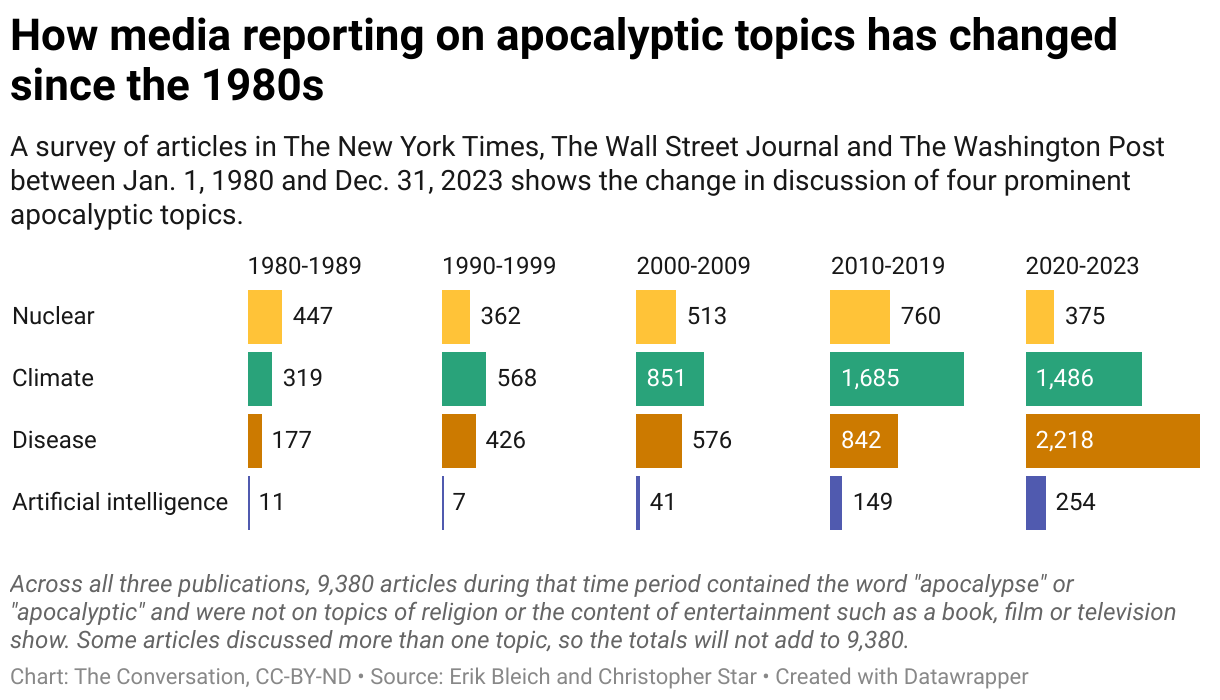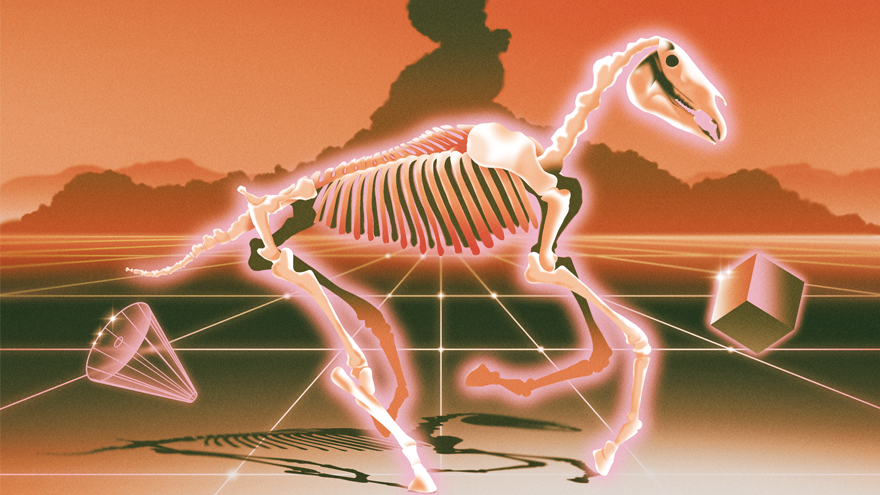The exponential growth of artificial intelligence over the past year has sparked discussions about whether the era of human domination of our planet is drawing to a close. The most dire predictions claim that the machines will take over within five to 10 years.
Fear of AI is not the only thing driving public concern about the end of the world. Climate change and pandemic diseases are also well-known threats. Reporting on these challenges and dubbing them potential “apocalypses” has become common in the media—so common, in fact, that it might go unnoticed, or may simply be written off as hyperbole.
Is the use of the word apocalypse in the media significant? Our common interest in how the American public understands apocalyptic threats brought us together to answer this question. One of us is a scholar of the apocalypse in the ancient world, and the other studies press coverage of contemporary concerns.
By tracing what events the media describe as “apocalyptic,” we can gain insight into our changing fears about potential catastrophes. We have found that discussions of the apocalypse unite the ancient and modern, the religious and secular, and the revelatory and the rational. They show how a term with roots in classical Greece and early Christianity helps us articulate our deepest anxieties today.
What is an apocalypse?
Humans have been fascinated by the demise of the world since ancient times. However, the word apocalypse was not intended to convey this preoccupation. In Greek, the verb apokalyptein originally meant simply “to uncover,” or “to reveal.”
In his dialogue Protagoras, Plato used this term to describe how a doctor may ask a patient to uncover his body for a medical exam. He also used it metaphorically when he asked an interlocutor to reveal his thoughts.
New Testament authors used the noun apokalypsis to refer to the “revelation” of God’s divine plan for the world. In the original Koine Greek version, apokalypsis is the first word of the Book of Revelation, which describes not only the impending arrival of a painful inferno for sinners, but also a second coming of Christ that will bring eternal salvation for the faithful.
The apocalypse in the contemporary world
Many American Christians today feel that the day of God’s judgment is just around the corner. In a December 2022 Pew Research Center Survey, 39 percent of those polled believed they were “living in the end times,” while 10 percent said that Jesus will “definitely” or “probably” return in their lifetime.
Yet for some believers, the Christian apocalypse is not viewed entirely negatively. Rather, it is a moment that will elevate the righteous and cleanse the world of sinners.
Secular understandings of the word, by contrast, rarely include this redeeming element. An apocalypse is more commonly understood as a cataclysmic, catastrophic event that will irreparably alter our world for the worse. It is something to avoid, not something to await.

What we fear most, decade by decade
Political communications scholars Christopher Wlezien and Stuart Soroka demonstrate in their research that the media are likely to reflect public opinion even more than they direct it or alter it. While their study focused largely on Americans’ views of important policy decisions, their findings, they argue, apply beyond those domains.
If they are correct, we can use discussions of the apocalypse in the media over the past few decades as a barometer of prevailing public concerns.
Following this logic, we collected all articles mentioning the words “apocalypse” or “apocalyptic” from the New York Times, the Wall Street Journal, and the Washington Post between January 1, 1980, and December 31, 2023. After filtering out articles centered on religion and entertainment, there were 9,380 articles that mentioned one or more of four prominent apocalyptic concerns: nuclear war, disease, climate change, and AI.
Through the end of the Cold War, fears of nuclear apocalypse predominated not only in the newspaper data we assembled, but also in visual media such as the 1983 postapocalyptic film The Day After, which was watched by as many as 100 million Americans.
By the 1990s, however, articles linking the word apocalypse to climate and disease—in roughly equal measure—had surpassed those focused on nuclear war. By the 2000s, and even more so during the 2010s, newspaper attention had turned squarely in the direction of environmental concerns.
The 2020s disrupted this pattern. COVID-19 caused a spike in articles mentioning the pandemic. There were almost three times as many stories linking disease to the apocalypse in the first four years of this decade compared to the entire 2010s.
In addition, while AI was practically absent from media coverage through 2015, recent technological breakthroughs generated more apocalypse articles touching on AI than on nuclear concerns in 2023 for the first time ever.
What should we fear most?
Do the apocalyptic fears we read about most actually pose the greatest danger to humanity? Some journalists have recently issued warnings that a nuclear war is more plausible than we realize.
That jibes with the perspective of scientists responsible for the Doomsday Clock who track what they think of as the critical threats to human existence. They focus principally on nuclear concerns, followed by climate, biological threats, and AI.
It might appear that the use of apocalyptic language to describe these challenges represents an increasing secularization of the concept. For example, the philosopher Giorgio Agamben has argued that the media’s portrayal of COVID-19 as a potentially apocalyptic event reflects the replacement of religion with science. Similarly, the cultural historian Eva Horn has asserted that the contemporary vision of the end of the world is an apocalypse without God.
However, as the Pew poll demonstrates, apocalyptic thinking remains common among American Christians.
The key point is that both religious and secular views of the end of the world make use of the same word. The meaning of apocalypse has thus expanded in recent decades from an exclusively religious idea to include other, more human-driven apocalyptic scenarios, such as a “nuclear apocalypse,” a “climate apocalypse,” a “COVID-19 apocalypse,” or an “AI apocalypse.”
In short, the reporting of apocalypses in the media does indeed provide a revelation—not of how the world will end but of the ever-increasing ways in which it could end. It also reveals a paradox: that people today often envision the future most vividly when they revive and adapt an ancient word.
Erik Bleich and Christopher Star are both faculty members at Middlebury. Bleich is the Charles A. Dana Professor of Political Science and Star is a professor of classics.
A version of this essay originally appeared in The Conversation.

Leave a Reply